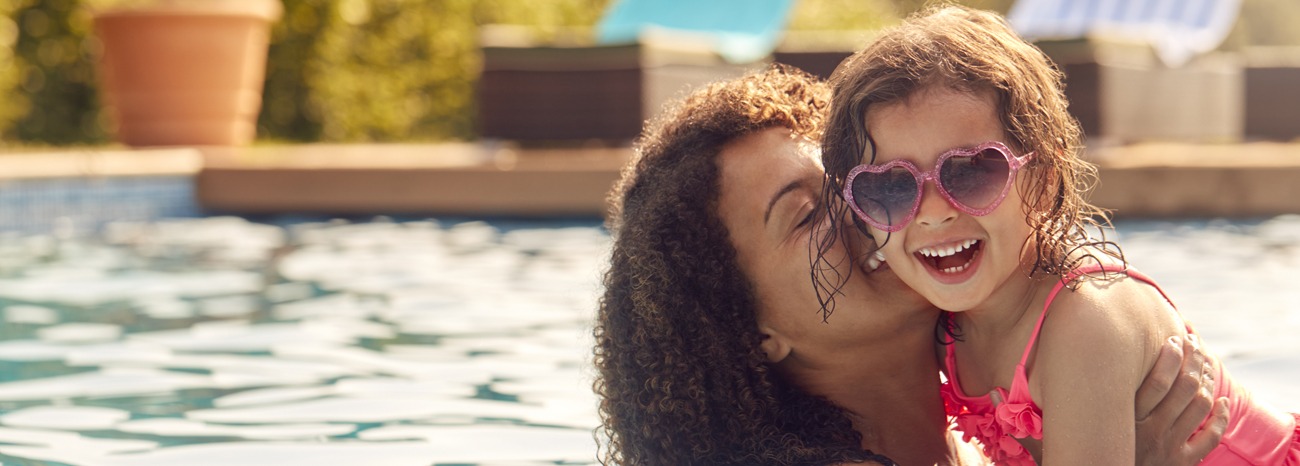Saltwater pools have been on the scene since the 1970’s, with the first known installation happening in New Zealand in 1972. They arrived in the United States in the 1980’s and have only increased in popularity. It may sound like an exotic, cost-prohibitive option but it’s really not. Many current pool owners are opting to convert their existing traditional pools to a saltwater system because of the health and safety benefits and the cost savings.
Is making the switch to saltwater for you? Read on to find out.
The first thing to know is that a saltwater pool is not free of chlorine. Instead of adding high amounts of chlorine to the pool in chemical form, the chlorine is created naturally thanks to the introduction of a 95%-100% pure form of salt (sodium chloride) and a simple piece of equipment, a saltwater chlorine generating system.
The system consists of a control box about the size of a lunchbox and a salt cell. Going through the system, the salt in the water converts to chlorine. The end result is pool water that is sanitized and safe to enjoy.
The general guide is to reach a salt level of 2400-3200 parts per million. This is just below the level of ocean water, which explains why you won’t experience a salty taste from the water in your saltwater pool.
The salt that is used is similar to table salt. But don’t reach for the saltshaker – table salt also contains iodine, which could lead to health issues if used in the pool.
Is a Saltwater Pool Better for Me?
One of the main reasons pool owners convert to saltwater is the improved experience in the water. Thanks to both the lower levels of chlorine and the type of chlorine present, swimming or lounging in a saltwater pool is much better for you.
Health benefits include:
- Goodbye, itchy eyes. Your eyes won’t be exposed to the harsher chemical version of chlorine since it’s produced naturally.
- No irritation to your lungs. Some people experience breathing problems or lung irritation after spending time in an over-chlorinated traditional pool.
- Improved skin. The chlorine in a traditional pool can leave your skin feeling itchy. Saltwater is a natural exfoliator and moisturizer, leading to your skin feeling softer and smoother post-swim.
- Stress reduction. Salt water works to help place the body in a more relaxed state.
- Joint and muscle relief. Bromide is a mineral component of salt that helps relieve soreness and pain in muscles and joints.
So, How Much Will This Cost?
If this will be your first pool, there is not much of a cost difference between installing and using a traditional or a saltwater pool. Both are an investment that will pay off in hours of relaxation and fun for you, your family and friends. While installing a saltwater pool will cost more at the beginning, you will likely spend less money in the long run.
The cost to convert from a traditional pool to saltwater is a percentage of the pool’s initial installation cost. You’ll need to pay for labor and the new components.
What if I don’t like it?
If after installation you realize that a saltwater pool just isn’t for you, can you convert back to freshwater? Absolutely. It’s a simple process, starting with removing as much of the salt water out as possible. We recommend draining the pool completely and cleaning the pool before refilling it for a return to the traditional, freshwater system.
This sounds great. But what else do I need to know?
Before making the move to saltwater, there are some additional factors to take into account.
- Saltwater is better for your skin but it is more corrosive to some surfaces, like vinyl linings, polymer wall panels, metal wall panels, concrete or plaster surfaced pools with tiled interiors, or handrail/ladder components made of galvanized steel. Fiberglass is the most compatible material to use with a saltwater swimming pool.
- Your traditional pool heating system will be compatible with a saltwater pool.
- You’ll save money because you won’t have to buy massive amounts of chlorine. The cost of the salt you will need is minimal in comparison.
- Opening and closing a saltwater pool doesn’t differ greatly from a freshwater pool. When closing, you will still need to make sure the water is drained below the water returns of the filter system to avoid water collecting and freezing in the components. Yes, that is still possible even with saltwater.
- Be mindful of your type of pool cover, especially if it is automatic, since corrosion is inevitable with the metal parts.
- Saltwater pools need far less monitoring and maintenance. But be careful, it’s easy to fall behind on taking care of your pool because you don’t have to do it as often. Get a refresher on pool maintenance with our comprehensive guide.
So, are you ready to make the move? If you already have a traditional pool, we can get you set up with a saltwater system and talk about a service plan so that all you have to do is enjoy your pool. Learn more about our saltwater pool conversion services or give us a call at 215.799.2008.


